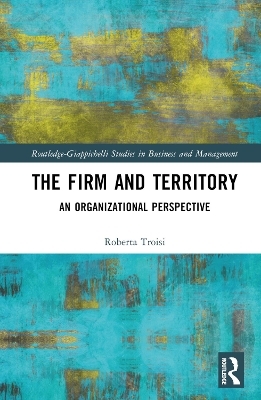
The Firm and Territory
An Organizational Perspective
Seiten
2022
Routledge (Verlag)
978-1-032-42959-5 (ISBN)
Routledge (Verlag)
978-1-032-42959-5 (ISBN)
This book investigates the relationship between the firm and the territory, emphasizing the micro-organizational dimension and the interactions between actors at territorial level.
This book investigates the relationship between the firm and the territory, emphasizing the micro-organizational dimension and the interactions between actors at territorial levels.
First, the book examines the particular features of the firm considering three key factors - structural design, power configuration and organizational culture – and the characteristics of the surrounding territory as a specific spatial ecosystem with its own institutions, agents, history and objectives. Second, it analyses organizational tenets at the micro- and meso levels with a view to explaining various relational models and their implications at the level of the firm and the territory. Although previous studies have focused on the territory as a geographical space in which firms procure resources and promote development, this book presents an innovative approach and makes a key contribution to the literature by dealing with the firm and the territory from an organizational perspective.
The relationship is analysed as bidirectional: a key question concerns how the territory can impact the organizational dimension of the firm, and how the firm can characterize the territory. This will be considered in connection with various effects. The positive effects of the relationship with the territory are investigated in terms of territorial identity, territorial resilience and territorial sustainability. The negative effects include the role of criminal networks rooted in the territory, with firms acting as key agents.
This book investigates the relationship between the firm and the territory, emphasizing the micro-organizational dimension and the interactions between actors at territorial levels.
First, the book examines the particular features of the firm considering three key factors - structural design, power configuration and organizational culture – and the characteristics of the surrounding territory as a specific spatial ecosystem with its own institutions, agents, history and objectives. Second, it analyses organizational tenets at the micro- and meso levels with a view to explaining various relational models and their implications at the level of the firm and the territory. Although previous studies have focused on the territory as a geographical space in which firms procure resources and promote development, this book presents an innovative approach and makes a key contribution to the literature by dealing with the firm and the territory from an organizational perspective.
The relationship is analysed as bidirectional: a key question concerns how the territory can impact the organizational dimension of the firm, and how the firm can characterize the territory. This will be considered in connection with various effects. The positive effects of the relationship with the territory are investigated in terms of territorial identity, territorial resilience and territorial sustainability. The negative effects include the role of criminal networks rooted in the territory, with firms acting as key agents.
Roberta Troisi is an Associate Professor and the Director of the Observatory for Territorial Development in the Department of Political and Communication Science at the University of Salerno, Italy.
1. Key features of the relationship between the firm and the territory 2. Positive implications of the relationship between the firm and the territory 3. Negative implications of the relationship between the firm and the territory 4. Conclusions
| Erscheinungsdatum | 13.08.2022 |
|---|---|
| Reihe/Serie | Routledge-Giappichelli Studies in Business and Management |
| Zusatzinfo | 6 Tables, black and white; 5 Line drawings, black and white; 1 Halftones, black and white; 6 Illustrations, black and white |
| Verlagsort | London |
| Sprache | englisch |
| Maße | 156 x 234 mm |
| Gewicht | 390 g |
| Themenwelt | Mathematik / Informatik ► Mathematik ► Finanz- / Wirtschaftsmathematik |
| Naturwissenschaften ► Geowissenschaften ► Geografie / Kartografie | |
| Sozialwissenschaften ► Soziologie ► Spezielle Soziologien | |
| Wirtschaft | |
| ISBN-10 | 1-032-42959-3 / 1032429593 |
| ISBN-13 | 978-1-032-42959-5 / 9781032429595 |
| Zustand | Neuware |
| Informationen gemäß Produktsicherheitsverordnung (GPSR) | |
| Haben Sie eine Frage zum Produkt? |
Mehr entdecken
aus dem Bereich
aus dem Bereich
Buch | Softcover (2023)
De Gruyter Oldenbourg (Verlag)
29,95 €


